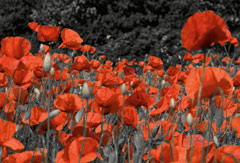In bitter January a black rime of ice sealed the frozen pores of the land. Trappist monk Thomas Merton often encouraged practitioners and gardeners alike to hunker down in this dormant season and “love winter, when the plant says nothing.” For more than a decade peace activists have set aside 64 days from January 30, the anniversary of Mahatma Gandhi’s death, through April 4, the anniversary of Dr. Martin Luther King’s assassination, as a season of nonviolence, an ideal time to commit to sit deep in the saddle of meditation and mindfulness. Yet even in this settled season the invisible plant kingdom is not voiceless. I hear moving through stone cold earth the old music of blood-red Flanders field poppies.

And no wonder. Poppy seed has the uncanny ability to lie dormant in soil for years and then, once the ground is stirred, to spring to new life. Most poppies are short-lived annuals requiring poor, dry soil and sundrenched exposure to grow. The cultivation of poppies dates back to remote antiquity, when in the Mediterranean world the poppy was aligned with Cybelle, the Near Eastern goddess of fertility and nature, and with her Greek counterpart, Demeter (Roman, Ceres). The poppy also has a lineage in the classical netherworld, where it is associated with Morpheus, god of dreams, and Hades, lord of the dead. Papaver somniferum, the opium poppy, has been cultivated for generations as a narcotic and pharmaceutical painrelieving medicine. Extracted from its latex sap, some twenty principles are contained in the opium poppy, among them morphine, codeine, and narcotine, as well as the stupor-inducing drug opium.
Doubly endowed with harmful and healing potential, the poppy evokes contrasting qualities. Accordingly, it represents not only sleep and forgetfulness but also the passion to remember and act. It is in this latter terrain that the Flanders field poppy takes root. After the First World War, this nonnarcotic plant, Papaver rhoeas, became a talisman of mindful remembrance. Those who returned at war’s end to Flanders in Belgium, where thousands of young soldiers had died in one of the fiercest battles on the Western Front, walked through field after war-churned field of sanguine red poppies in full bloom. In 1915 the Canadian Army’s physician, John McCrae, memorialized the fallen in his poem “In Flanders Fields”:
We are the Dead. Short days ago
We lived… and now we lie…
We shall not sleep, though poppies grow
In Flanders fields.
By the close of World War I on Armistice Day, November 11, 1918, the death toll in Europe exceeded four million. Every year since then, two minutes of silence have been observed on November 11 throughout the world. In 2008, 10,000 people commemorated the ninetieth anniversary of Armistice Day by standing silently in Trafalgar Square, releasing hundreds upon hundreds of red poppy petals into the fountains of London to close the ceremony. In the United States, war veterans have crafted paper and cloth poppies since 1921 to remember the dead. A record 37 million such lapel poppies, also made by veterans, were sold in England alone in 2006.
In my extended Zen mindfulness circle, we have convened for weekends of meditation and writing every Veterans Day and Memorial Day weekend for almost fifteen years. Zen practitioners and combat veterans gather alongside artists, caregivers, family, and friends. This last November, a few days after our retreat ended, I made a solitary pilgrimage to the huge Veterans’ Hospital on the cliffs above the Pacific in San Francisco. It was a grave and cold day. A slate gray wind moaned over the surface of the ocean. I had a secret cache of Flanders field poppy seed stuffed in my pockets. Wherever I found disturbed soil in the newly cultivated and still-empty flower beds surrounding the mental health unit of the hospital and in the 20 or so freshly filled planting urns waiting to be distributed around the hospital grounds, I scattered the seed of the crimson poppy of Flanders.
When it comes to gardens, I am neither superstitious nor sentimental. Created for millennia to honor the dead, gardens also save lives. They thin the veil between worlds. In this winter season of nonviolence, with war raging hot on the earth, the ancient poppies say nothing, pushing open new ground.
Thank you for subscribing to Tricycle! As a nonprofit, we depend on readers like you to keep Buddhist teachings and practices widely available.